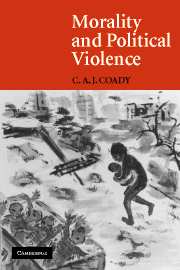Book contents
- Frontmatter
- Contents
- Preface
- Morality and Political Violence
- 1 Staring at Armageddon
- 2 The Idea of Violence
- 3 Violence and Justice
- 4 Aggression, Defence, and Just Cause
- 5 Justice with Prudence
- 6 The Right Way to Fight
- 7 The Problem of Collateral Damage
- 8 The Morality of Terrorism
- 9 The Immunities of Combatants
- 10 Morality and the Mercenary Warrior
- 11 Objecting Morally
- 12 Weapons of Mass Destruction
- 13 The Ideal of Peace
- 14 The Issue of Stringency
- Bibliography
- Index
1 - Staring at Armageddon
Published online by Cambridge University Press: 05 June 2012
- Frontmatter
- Contents
- Preface
- Morality and Political Violence
- 1 Staring at Armageddon
- 2 The Idea of Violence
- 3 Violence and Justice
- 4 Aggression, Defence, and Just Cause
- 5 Justice with Prudence
- 6 The Right Way to Fight
- 7 The Problem of Collateral Damage
- 8 The Morality of Terrorism
- 9 The Immunities of Combatants
- 10 Morality and the Mercenary Warrior
- 11 Objecting Morally
- 12 Weapons of Mass Destruction
- 13 The Ideal of Peace
- 14 The Issue of Stringency
- Bibliography
- Index
Summary
… my thoughts were powerless against an unhappiness so huge. I couldn't alter European history, or order the artillery to stop firing. I could stare at the War as I stared at the sultry sky, longing for life and freedom and vaguely altruistic about my fellow-victims. But a second-lieutenant could attempt nothing – except to satisfy his superior officers; and altogether, I concluded, Armageddon was too immense for my solitary understanding.
Siegfried SassoonSassoon's ironic articulation of the enormity of war and its capacity to reach beyond understanding or individual control captures something that has been echoed in the thoughts and writings of many participants, observers, and theorists of warfare. Indeed, the impotence and blankness that Sassoon describes is one of the perceptions that lies behind a famous dictum propounded by the philosopher Thomas Hobbes in the seventeenth century. Always a foe of euphemism and evasion, Hobbes succinctly posed a central issue with which much of this book will be concerned: “Where there is no common power, there is no law: where no law, no injustice. Force and fraud, are in war the two cardinal virtues.” Amongst other things, we shall examine whether this bleak view is true and what would follow if it were. Initially, the existence of laws of war, just war theories, and codes of military ethics would seem to give the lie to Hobbes, and it is interesting that he makes virtually no reference to the extensive body of writing on such matters that existed at the time he wrote, though he must have been familiar with it.
- Type
- Chapter
- Information
- Morality and Political Violence , pp. 1 - 20Publisher: Cambridge University PressPrint publication year: 2007



